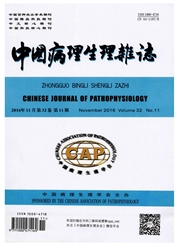

 中文摘要:
中文摘要:
假体周围骨溶解是全关节翻修术的主要原因之一,如果在缺乏影像学诊断和(或)正确的治疗手段下而任其进展,骨溶解造成的无菌性松动会导致假体置换的失败,患者将需要进行关节翻修术。这篇综述的目的是立足于本体因素和未来发展方向的前提下来评估近几年对假体周围骨溶解的认识。假体周围骨溶解来源于多种危险因素。骨溶解特有的主体因素包括性别、体重和遗传学因素。新近的假体设计已经降低了这种情况的发生,但是没有一种设计可以代替体内原有的结构特征,因此,我们仍然可以看到关于磨损颗粒的的研究进展。在影像学诊断方面,先进的技术不断出现,但是在早期诊断方面依然缺乏有效的方法。药物干预看似是一种可行的医学干预方法,但是目前还没有明确的药物治疗被证明在阻止或抑制假体周围骨溶解方面是可行的。尽管随着假体设计的进步和对磨损颗粒诱导的假体周围骨溶解生物学过程知识的不断丰富,假体周围骨溶解率在下降,但是在未来二十年全关节置换术数量将快速上升,这意味着我们将需要诊断和治疗假体周围骨溶解的更好方法。
 英文摘要:
英文摘要:
Periprosthetic osteolysis is one of the main reason of total joint revision procedures, the patient will undergo revision of total hip prosthesis result form failure of implant caused by aseptic loosening, if treated inappropriately or lack of radiographic diagnosis. The purpose of this review is to summarize the effects of host factor on Periprosthetic osteolysis and explore the future directions. Periprosthetic osteolysis result from many risk factors. Osteolysis host characteristic risk factors include gender, body weight,and genetics. Although current implant designs have reduce the rate of this disease, none of the designs can perfectly replace the in vivo characteristics and the development of wear debris never stop. Advanced techniques continues to be seen on radiographic diagnosis, but methods of early diagnosis is ineffective. Drug intervention seems to be a feasible avenue for medical intervention, but no drug have been proven to be able to prevent or inhibit Periprosthetic osteolysis by now. Although the rate of Periprosthetic osteolysis is decreased with the development of the implant design and increased knowledge of the biological process of wear particle induced osteolysis, but the number of total joint arthroplasties will increase rapidly over the next two decades, this means we need better methods to diagnosis and treat Periprosthetic osteolysis.
 同期刊论文项目
同期刊论文项目
 同项目期刊论文
同项目期刊论文
 Meta-analysis for the potential application of FLT3-TKD mutations as prognostic indicator in non-pro
Meta-analysis for the potential application of FLT3-TKD mutations as prognostic indicator in non-pro Clinical characteristics and outcomes of mixed phenotype acute leukemia with Philadelphia chromosome
Clinical characteristics and outcomes of mixed phenotype acute leukemia with Philadelphia chromosome Effect of G-Rich Oligonucleotides on the Proliferation of Leukemia Cells and Its Relationship with p
Effect of G-Rich Oligonucleotides on the Proliferation of Leukemia Cells and Its Relationship with p An auto-SCT-based total therapy resulted in encouraging outcomes in adolescents and young adults wit
An auto-SCT-based total therapy resulted in encouraging outcomes in adolescents and young adults wit 期刊信息
期刊信息
